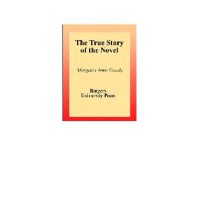
Ebook: The True Story of the Novel
Author: Margaret Anne Doody
- Year: 1996
- Publisher: Rutgers Univ Pr
- Edition: 1
- Language: English
- pdf
"One of the most successful literary lies," declares Margaret Anne Doody, "is the English claim to have invented the novel.... One of the best-kept literary secrets is the existence of novels in antiquity." In fact, as Doody goes on to demonstrate, the Novel of the Roman Empire is a joint product of Africa, Western Asia, and Europe. It is with this argument that The True Story of the Novel devastates and reconfigures the history of the novel as we know it.
Twentieth-century historians and critics defending the novel have emphasized its role as superseding something else, as a sort of legitimate usurper that deposed the Epic, a replacement of myth, or religious narrative. To say that the Age of Early Christianity was really also the Age of the Novel rumples such historical tidiness - but so it was. From the outset of her discussion, Doody rejects the conventional Anglo-Saxon distinction between Romance and Novel. This eighteenth-century distinction, she maintains, served both to keep the foreign - dark-skinned peoples, strange speakers, Muslims, and others - largely out of literature and to obscure the diverse nature of the novel itself.
This deeply informed and truly comparative work is staggering in its breadth. Doody treats not only recognized classics, but also works of usually unacknowledged subgenres - new readings of novels like The Pickwick Papers, Pudd'nhead Wilson, L'Assommoir, Death in Venice, and Beloved are accompanied by insights into Death on the Nile or The Wind in the Willows. Non-Western writers like Chinua Achebe and Witi Ihimaera are also included. In her last section, Doody goes on to show that Chinese and Japanese novels, early and late, bear a strong and not incidental affinity to their Western counterparts. Collectively, these readings offer the basis for a serious reassessment of the history and the nature of the novel.
Twentieth-century historians and critics defending the novel have emphasized its role as superseding something else, as a sort of legitimate usurper that deposed the Epic, a replacement of myth, or religious narrative. To say that the Age of Early Christianity was really also the Age of the Novel rumples such historical tidiness - but so it was. From the outset of her discussion, Doody rejects the conventional Anglo-Saxon distinction between Romance and Novel. This eighteenth-century distinction, she maintains, served both to keep the foreign - dark-skinned peoples, strange speakers, Muslims, and others - largely out of literature and to obscure the diverse nature of the novel itself.
This deeply informed and truly comparative work is staggering in its breadth. Doody treats not only recognized classics, but also works of usually unacknowledged subgenres - new readings of novels like The Pickwick Papers, Pudd'nhead Wilson, L'Assommoir, Death in Venice, and Beloved are accompanied by insights into Death on the Nile or The Wind in the Willows. Non-Western writers like Chinua Achebe and Witi Ihimaera are also included. In her last section, Doody goes on to show that Chinese and Japanese novels, early and late, bear a strong and not incidental affinity to their Western counterparts. Collectively, these readings offer the basis for a serious reassessment of the history and the nature of the novel.
Download the book The True Story of the Novel for free or read online
Continue reading on any device:

Last viewed books
Related books
{related-news}
Comments (0)